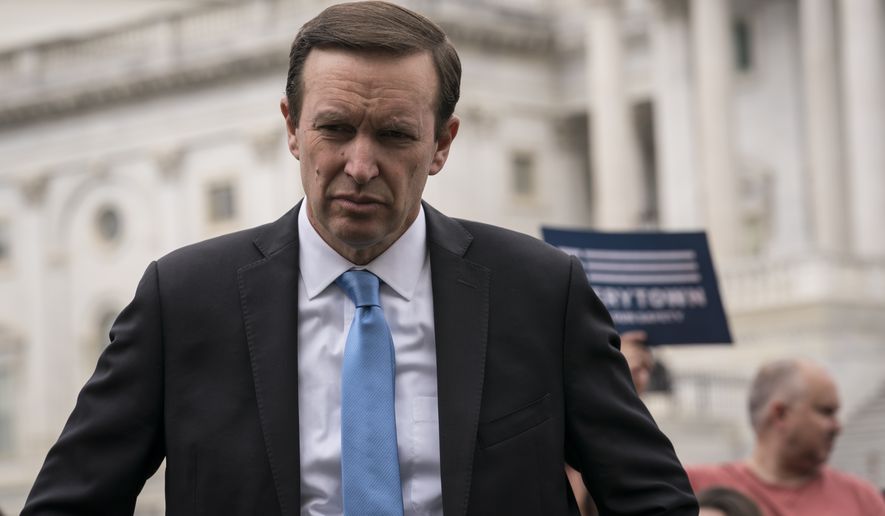Senate Democrats are quick to give their stamp of approval to President Biden’s labeling of “MAGA Republicans” as threats to democracy and semi-fascists.
Their terse criticism of political opponents, however, quickly subsides when asked to point fingers at exactly who among their Republican colleagues is such a danger to the country.
Senate Democrats dodged The Washington Times’ questions about which specific Republicans they deem risks to America’s democratic institution and, as Mr. Biden said, the “soul of the nation.”
Sen. Cory A. Booker, New Jersey Democrat, said “people who are undermining our democracy — whoever they are — we all should be doing something about that.”
He refused to name names.
An outlier was Sen. Christopher Murphy, who said those who contested the 2020 election results were a “threat to democracy.” The Connecticut Democrat declined to name them.
“Donald Trump tried to destroy our democracy. His supporters tried to storm the Capitol and tried to kill us. The president would be negligent if he wasn’t raising a really dangerous state of affairs given just the insane direction that Trump’s movement has taken,” Mr. Murphy said. “My colleagues voted to overturn the election. Six or seven of my colleagues in the Senate voted to throw out Joe Biden’s victory and install Donald Trump as a monarch. That’s a threat to democracy.”
Eight Republican senators voted to contest the electoral results of at least one state. Those members were Josh Hawley of Missouri, Ted Cruz of Texas, Tommy Tuberville of Alabama, John Kennedy of Louisiana, Roger Marshall of Kansas, Rick Scott of Florida, Cindy Hyde-Smith of Mississippi and Cynthia M. Lummis of Wyoming.
Ms. Lummis took offense.
“I find the president’s rhetoric to be incendiary and offensive and annoying and portraying a large swath of the American people as following a cultlike figure, as opposed to supporting principles and success that we enjoyed when President Trump was president,” she said. “You could feel the prosperity in the air in Wyoming while President Trump was president.”
Mr. Marshall accused the White House and congressional Democrats of ignoring political violence on the left such as the 2020 riots stemming from racial justice demonstrations.
“To lump me in with people that would encourage violence? I’ve always condemned all the violence consistently, yet this White House doesn’t condemn the violence of the riots of 2020,” he said. “They don’t condemn the violence against Supreme Court justices.”
Mr. Hawley declined to comment but accused Mr. Biden of referring to “half of the country” as extremists.
The other Republican senators did not respond to requests for comment.
Stumping for Democrats in battleground states, the president has used several recent speeches to lambast “MAGA Republicans” who “embrace political violence” and pose threats to personal and economic freedoms. He attempted to separate such Republicans from those he deems “mainstream” and who were his colleagues when he was a senator from Delaware.
The tactic puts members of his party, particularly those in tight races, in awkward positions.
“I want to be very clear upfront: Not every Republican is a MAGA Republican. Not every Republican embraces that extreme ideology,” Mr. Biden said during a Labor Day speech in Milwaukee. “But the extreme MAGA Republicans in Congress have chosen to go backward full of anger, violence, hate and division.”
Although many Senate Democrats agreed with the president’s language and his characterization of MAGA Republicans, they refused to name which, if any, of their Republican colleagues may pose a danger.
“I don’t view them as a threat to democracy,” said Sen. Christopher A. Coons, Delaware Democrat. “But there have been some statements and actions and electoral initiatives in recent months that are pretty gravely concerning.”
Mr. Coons, known as the “Biden whisperer” for his longtime close ties to Mr. Biden, said he viewed the president’s rhetoric as an attempt to highlight the differences between traditional conservatives and those who questioned the results of the 2020 presidential election.
“I think our president is trying to draw a distinction between the very small but very real subset of elected officials who either encouraged or condoned or supported that assault on our Capitol, from the majority serving here in this body who said, ‘Hang on. That’s really a step too far,’” he said.
Sen. Bernard Sanders of Vermont, a democratic socialist who caucuses with Democrats, would point a finger only at Mr. Trump.
“It’s hard to deny that when you have a president who claims to his supporters that he actually won the election — when he lost the election — that he’s undermining American democracy and faith in our political system,” he said. “That is extremely, extremely dangerous.”
Notably, the most anti-Trump Republicans in the Senate declined to condemn or endorse Mr. Biden’s extreme rhetoric.
“I’m really not planning on commenting on words he may have said,” said Sen. Mitt Romney, a Utah Republican who voted to impeach Mr. Trump. “He has the right to express his point of view, whether or not I agree with it.”
• Mica Soellner can be reached at msoellner@washingtontimes.com.
• Ramsey Touchberry can be reached at rtouchberry@washingtontimes.com.




Please read our comment policy before commenting.